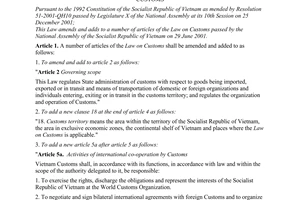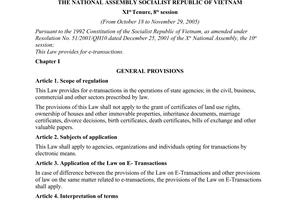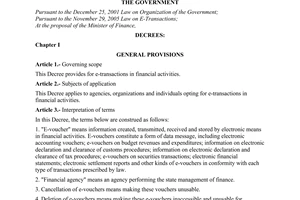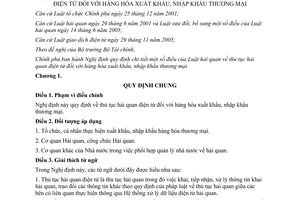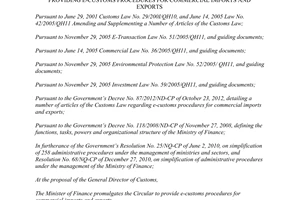Decree No. 87/2012/ND-CP detailing a number of articles of the Law on customs ap đã được thay thế bởi Decree No. 08/2015/ND-CP guidance on enforcement of the customs law on customs procedures examination và được áp dụng kể từ ngày 15/03/2015.
Nội dung toàn văn Decree No. 87/2012/ND-CP detailing a number of articles of the Law on customs ap
|
THE
GOVERNMENT |
SOCIALIST
REPUBLIC OF VIETNAM |
|
No. 87/2012/ND-CP |
Hanoi, October 23, 2012 |
DECREE
DETAILING A NUMBER OF ARTICLES OF THE LAW ON CUSTOMS APPLICABLE TO ELECTRONIC CUSTOMS PROCEDURES FOR COMMERCIAL EXPORTS AND IMPORTS.
Pursuant the Law on Government organization dated December 25th 2001;
Pursuant to the Law on Customs dated June 29th 2001, and the Law on amending and supplementing a number of articles of the Law on Customs dated June 14th 2005;
Pursuant the Law on Electronic transaction dated November 29th 2005;
At the proposal of the Minister of Finance,
The Government promulgates a Decree to detail a number of articles of the Law on Customs applicable to electronic customs procedures for commercial exports and imports.
Chapter 1.
GENERAL PROVISIONS
Article 1. Scope of regulation
This Decree prescribes the electronic customs procedures applicable to commercial exports and imports.
Article 2. Subjects of application
1. Organizations and individuals that export and import commercial goods.
2. The customs agencies and the customs officers.
3. Other State agencies in the cooperation in the State management of customs.
Article 3. Interpretation of terms
The terms in this Decree are construed as follows:
1. Electronic customs procedures are customs procedures in which the declaration, reception, and processing of information about customs declaration, and the exchange of other information, as prescribed by law provisions on customs procedures, among the involved parties via the Customs electronic data processing system.
2. The customs electronic data processing system is a system managed by the General Department of Customs for carrying out electronic customs procedures.
3. The customs electronic data processing system is a system that serves the customs declarants (hereinafter referred to as the declarants), and receives information and feedbacks from the customs while carrying out electronic customs procedures.
4. Risk management is the systematic application of measures for collecting and analyzing information in order to assess the level of risk of violations, as the basis for the customs to decide the form and the degree on inspection and supervisions of exported and imported goods.
5. Electronic customs declaration sheet is a kind of electronic documents, comprising the information of a customs declarant.
6. Malfunction is the case when the customs electronic data processing system or the electronic customs declaration system fails to make electronic transactions, for which the reasons might be one of both systems, or some other reasons that make the electronic customs procedures unable to be completed.
Article 4. Rights and obligations of declarants of electronic customs
A part from the rights and obligations of declarants prescribed in the Law on Customs; the rights and obligations of tax payers prescribed in laws on tax; the rights and obligations of subjects making electronic transaction prescribed in the Law on Electronic transaction, and the legal documents guiding the implementation, a declarant of electronic customs also have the following rights and obligations:
1. Declarants of electronic customs are entitled to:
a) Be prioritized to make declaration sooner than making paper customs dossiers when the customs decides to examine the customs dossier or inspect the goods;
b) Make electronic customs declaration 24 hours per day and 7 days per week, and directly receive feedbacks from the customs via the customs electronic data processing system; receive the results within 04 hours as from the beginning or the next working days when making customs declaration outside office hours as prescribed by law, and the documents in the customs dossier is required be submitted or presented to complete the next procedures;
c) Choose to use the documents printed from the electronic customs declaration system (signed and stamped by the declarant), applicable to the consignments that the customs has granted customs clearance on the customs electronic data processing system, as permits for transporting goods;
d) Choose a method of paying customs fees and the fees that the customs collects on behalf of other associations (if any) for each customs declaration sheet, or for all the customs declaration sheets submitted in a month;
dd) Be provided with information about the progress of processing the electronic customs dossier via the customs electronic data processing system.
2. Obligations of declarants of electronic customs
a) Keeping the electronic documents in the customs dossier (including the copies) as prescribed by the Law on Electronic transaction and relevant legal documents; providing electronic documents related to the exported and imported goods to serve the inspection of the customs;
b) If it is required to submit paper documents to the customs when following the electronic customs procedures, the declarant must sign and stamp the documents and bear responsibility before law for the accuracy of such documents;
c) When completing electronic customs procedures, the declarant must use the digital signature that has been registered with the customs. When the digital signature is not available at that time, it is allowed to use the account in the customs electronic data processing system to complete the electronic customs procedures. The declarant must protect the account used for making transaction with the customs via the customs electronic data processing system, and bear responsibility for the transactions as prescribed by law.
The Ministry of Finance shall formulate the roadmap of applying digital signatures when following electronic customs procedures.
d) Satisfying the requirements for information technology and skills in electronic customs declaration. If the requirements for information technology and skills in electronic customs declaration are not satisfied, it is required to hire a capable agency to carry out the electronic customs procedures..
Article 5. Duties and authority of the customs agencies and the customs officers
1. Performing the duties and exercising the authority prescribed in Article 27 of the Law on Customs; the Law on Tax administration; the Law on Electronic transaction, and the Government's Decree No. 27/2007/NĐ-CP dated February 02nd 2007 on electronic transaction in finance.
2. Building, managing, operating, developing the customs electronic data processing system to carry out electronic customs procedures as prescribed by the Ministry of Finance.
3. Carrying out dissemination, providing support, training, and instruction for declarants to comply with law provisions on electronic customs procedures. Carrying our inspection and handling the violations.
Article 6. Customs electronic data processing system
The Ministry of Finance shall lead and cooperate with relevant parties in assigning tasks to each parties in building, managing, operating, and using the customs electronic data processing system; prescribing the requirements for information technology and electronic customs declaration skills of declarants.
Article 7. Principles of electronic customs procedures
1. Electronic customs procedures are carried out following the principles prescribed in Article 15 of the Law on Customs; Article 5 and Article 40 of the Law on Electronic transaction, and the laws related to the import and export of goods.
2. The customs shall apply the risk management during the customs supervision and inspection to the exported goods and imported goods, the customs dossiers, and the documents related to exported and imported goods while carrying out electronic customs procedures.
3. The declarants shall register for electronic customs procedures as prescribed by the Ministry of Finance.
Chapter 2.
ELECTRONIC CUSTOMS PROCEDURES APPLICABLE TO COMMERCIAL EXPORTS AND IMPORTS
Article 8. Customs electronic dossiers
1. A customs electronic dossier comprises:
a) The electronic customs declaration sheet;
b) Other documents in the electronic customs dossier being the documents prescribed in Clause 1 Article 22 of the Law on Customs that the declarant must submit or present to the customs. These documents may be papers or electronic documents, or documents converted from papers to the electronic form and vice versa. The other documents in the electronic customs dossier in the electronic form or converted form are as eligible for following electronic customs procedures as the paper documents, unless otherwise prescribed by law.
2. The Ministry of Finance shall specify the content and formats of information indexes on the electronic customs declaration sheet; the format of other electronic documents in the electronic customs dossier, and the use of electronic customs dossiers.
3. The electronic customs dossiers stored in the customs electronic data processing system are legally valid for customs procedures and settling disputes.
Article 9. Customs electronic declaration
1. The time limit for making electronic customs declaration applicable to commercial exports and imports are prescribed in Clause 1 and Clause 2 Article 18 of the Law on Customs.
2. The declarant must completely, accurately, and clearly provide the information in the electronic customs declaration sheet; calculate the tax and other amounts payable to the State budget, and bear responsibility for the provided information.
3. When making the electronic customs declaration, the declarant must:
a) Create the information about the electronic customs declaration sheet on the electronic customs declaration system;
b) Send the electronic customs declaration sheet to the customs via the customs electronic data processing system;
If the customs request other documents in the electronic customs dossier before making the declaration, the declarant must send the information to the customs electronic data processing system.
c) Receive feedbacks and follow the instruction from the customs.
4. The supplementation, adjustment, and replacement of electronic customs declaration sheets are prescribed in Clause 2 Article 2 of the Law on Customs and the Law on Tax administration.
Article 10. The reception, inspection, registration, and classification of electronic customs declaration sheets
1. The customs electronic data processing system shall receive, inspect, and register the electronic customs declaration sheet 24 hours per day and 7 days per week. If the documents in the customs dossier must be submitted or presented, the customs officers shall directly check the declaration made by the declarant and decide whether or not to register the declaration within the office hours as prescribed in Article 19 of the Law on Customs.
2. If the declaration sheet registration is not accepted, the customs must inform the declarant via the customs electronic data processing system, and specify the reasons.
3. If the declaration sheet registration is accepted, the customs electronic data processing system shall issue the electronic customs declaration sheet number, carry out classification, and send feedbacks to the declarant. The classification must be done in one of the following forms:
a) Accepting the information in the electronic customs declaration sheet and grant the customs clearance;
b) Submitting, presenting the documents in the electronic customs dossier for inspection before granting the customs clearance as prescribed in Article 11 of this Decree;
c) Submitting, presenting the papers in the electronic customs dossier and the goods for inspection before granting the customs clearance.
Article 11. Inspecting customs electronic dossiers
1. Methods of inspection: Inspecting electronic dossiers on the customs electronic data processing system or inspecting paper dossiers.
2. The content of inspection: Inspecting the content in the electronic customs declaration sheet and the documents in the electronic customs dossier; compare them to the documents in the electronic customs dossier; inspect the conformity of the declaration and law provisions.
Article 12. Actual inspection of goods
1. The methods and degree of inspection
a) The method on goods inspection: Carried out by customs officers or technical machinery and equipment, or other processes;
b) The degree of inspection: Inspecting part of or the entire consignment.
2. The authority to decide the method and degree of inspection
The Head of the customs agency where the electronic customs procedures are carried out shall decide the method and degree of inspection.
3. The content of goods inspection
Checking the names, codes, quantity, weight, kinds, quality, and origins of goods; compare them to the goods inspected with the electronic customs dossier.
Article 13. Moving goods to another customs post outside the border-gate area
1. The declarant shall send the request for moving goods to another customs post outside the border-gate area to the customs where the imported goods is moved in, or the customs where the exported goods is moved out, and receive the decision from the customs about the move of goods.
The declarant must protect the status quo of their goods, the customs seal, the transport seal, and make sure that the goods is transported on the right route, to the right location and border-gate, and at the right time as registered with, and approved by the customs.
2. The customs where the imported goods is moved in, and the customs where the exported goods is moved out, shall receive the request for moving goods to another customs post outside the border-gate area, and decide to whether accepted, and send feedbacks via the customs electronic data processing system to the declarant.
3. The customs where the imported goods is moved in, and the customs where the exported goods is moved out, shall decide the goods inspection when finding signs of violations of law provisions on customs, or the requirements for customs management are not satisfied.
4. The customs where the goods is moved out and the customs where the goods is moved in must supervise the goods allowed to be moved to another custom post outside the border-gate area.
The Ministry of Finance shall specifies the kinds of goods eligible for being moved to another custom post outside the border-gate area as prescribed in this Article.
Article 14. Supervision of exported and imported goods that follows electronic customs procedures
1. Methods of customs supervision:
a) Customs sealing;
b) Direct supervision by customs officers when necessary;
c) Supervising using technical devices, including: camera supervision, supervision via information inspection, supervision by other technical devices.
2. The identification of consignments and key locations to employ the methods of customs supervision prescribed in Clause 1 this Article shall be carried out based on the risk analysis.
Article 15. Customs procedures during system malfunction
1. When the customs electronic data processing system malfunctions, the customs must announce it on the customs website within 02 hours as from the malfunction occurs if the malfunction occurs during office hours, or within 02 hours as from the beginning of the next working day if the malfunction occurs outside office hours as prescribed by law, and enable declarants to follow customs procedures manually.
2. When the electronic customs declaration system of declarants malfunctions, the declarant must inform the customs in writing or by phone or by email as registered with the customs for settlement in cooperation. Also, in order to ensure the punctuality of the customs procedures, the declarant may follow the customs procedures manually.
Chapter 3.
IMPLEMENTATION PROVISIONS
Article 16. Effects
This Decree takes effect on January 01st 2013.
Article 17. Effects
1. The Ministry of Finance shall guide the implementation of this Decree.
2. The Ministries and relevant State agencies must cooperate in standardizing, providing, and exchanging information about the exports and imports with the customs to carry out customs procedures as prescribed in this Decree; implementing the ASEAN single window system and the national single window system of customs.
3. The Ministers, Heads of ministerial-level agencies, Heads of Governmental agencies, the Presidents of People’s Committees of central-affiliated cities and provinces are responsible for the implementation of this Decree./.
|
|
FOR THE
GOVERNMENT |
------------------------------------------------------------------------------------------------------
This translation is made by LawSoft and
for reference purposes only. Its copyright is owned by LawSoft
and protected under Clause 2, Article 14 of the Law on Intellectual Property.Your comments are always welcomed


